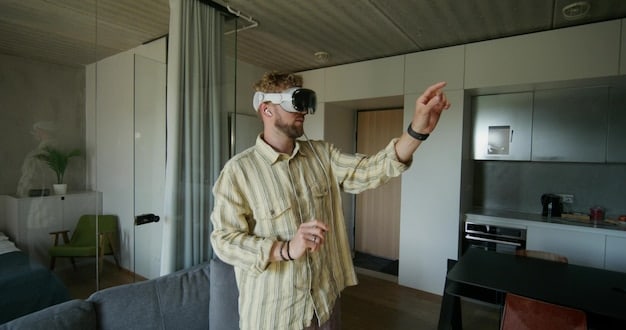Real Estate Tech Startups Transforming US Property & Investment

The US real estate tech sector is undergoing a profound transformation, with startups leveraging advanced technologies like AI, blockchain, and data analytics to optimize property management, streamline transactions, and democratize investment opportunities, fundamentally altering how real estate operates.
In an era defined by rapid technological advancement, the real estate industry, traditionally slow to adopt change, is now experiencing a seismic shift. This Startup Spotlight: Real Estate Tech – Transforming Property Management and Investment in the US Market delves into how innovative companies are reimagining everything from how properties are bought and sold to how they are managed and financed, offering unprecedented efficiencies and accessibility.
The Dawn of PropTech: A Market Redefined
PropTech, or Property Technology, represents the convergence of real estate and technology, ushering in a new era of efficiency, transparency, and accessibility. This emerging sector is not merely about digitizing existing processes; it’s about fundamentally rethinking them, introducing disruptive solutions that challenge traditional norms and open up new avenues for growth and innovation.
The US market, with its vast and complex real estate landscape, serves as a fertile ground for PropTech innovation. From residential brokerage to commercial property management, and from real estate investment to construction, every facet of the industry is being touched by technological advancements. These changes are driven by a compelling need for greater efficiency, reduced costs, enhanced customer experience, and more informed decision-making.
Key Technologies Driving PropTech Innovation
Several foundational technologies are propelling the PropTech revolution forward. Each plays a distinct role in reshaping the industry, offering unique capabilities that, when combined, create powerful solutions. Understanding these technological pillars is crucial to comprehending the scope and potential of the transformation underway.
- Artificial Intelligence (AI) and Machine Learning (ML): Revolutionizing data analysis, predicting market trends, personalizing client experiences, and automating routine tasks in property management.
- Blockchain and Distributed Ledger Technology (DLT): Enhancing transparency, security, and efficiency in transactions, enabling fractional ownership, and streamlining record-keeping.
- Big Data Analytics: Providing unprecedented insights into market dynamics, property valuations, and consumer behavior, enabling data-driven strategies for investors and developers.
- Internet of Things (IoT) and Smart Home/Building Tech: Optimizing energy consumption, enhancing security, and improving occupant comfort and experience in residential and commercial properties.
The integration of these technologies is allowing PropTech startups to build comprehensive platforms that cater to diverse needs across the real estate value chain. This multi-faceted approach ensures that innovation addresses a wide array of pain points, from simplifying complex legal processes to optimizing property maintenance schedules. The result is a more dynamic, responsive, and ultimately more prosperous real estate ecosystem.
Transforming Property Management with Tech Solutions
Property management, traditionally a labor-intensive and often reactive field, is undergoing a profound transformation thanks to PropTech. Startups are introducing sophisticated platforms that automate routine tasks, enhance communication, and provide real-time insights, allowing property managers to operate with unprecedented efficiency and strategic foresight. These innovations are not just about saving time; they’re about elevating the entire resident and owner experience.
The shift towards intelligent property management systems marks a departure from manual processes and fragmented data. Centralized platforms now manage everything from lease agreements and rent collection to maintenance requests and financial reporting. This unification of data and processes provides a holistic view of property operations, enabling proactive decision-making and better responsiveness to issues as they arise.
Automation and Efficiency in Operations
The automation capabilities of new property management software are perhaps their most impactful feature. Tasks that once consumed hours are now completed in minutes, freeing up valuable time for strategic initiatives and direct tenant engagement. This efficiency translates directly into cost savings and improved service delivery.
- Automated Rent Collection and Payment Processing: Digital portals allow tenants to pay rent online, with automated reminders and direct deposit features simplifying the financial side of management.
- Streamlined Maintenance Ticketing and Dispatch: Tenants can submit maintenance requests through an app, which are then automatically routed to the appropriate vendor, tracked, and updated in real-time.
- AI-powered Lease Management: Smart contracts and AI algorithms can assist in drafting, reviewing, and managing lease agreements, flagging compliance issues and ensuring accuracy.
- Predictive Maintenance: Leveraging IoT sensors and data analytics to predict equipment failures or maintenance needs before they become critical issues, reducing downtime and costs.
Beyond automation, these systems offer advanced analytics that provide deep insights into property performance. Dashboards present key metrics such as occupancy rates, maintenance costs, and tenant satisfaction scores, empowering property managers to identify trends, optimize operations, and make data-driven decisions that enhance profitability and tenant retention.
Innovating Real Estate Investment and Financing
The realm of real estate investment and financing, once dominated by large institutional players and high barriers to entry, is being democratized and diversified by PropTech startups. These innovations are opening up investment opportunities to a broader spectrum of individuals, streamlining the financing process, and enhancing transparency across the board. The traditional models are being challenged by platforms that leverage technology to make real estate investing more accessible, efficient, and secure.
A significant aspect of this transformation is the rise of crowdfunding platforms and fractional ownership models. These allow multiple investors to collectively own a share of a property, reducing the capital required and spreading risk. This paradigm shift means that real estate investment is no longer exclusively for the wealthy, but for anyone with a modest sum looking to diversify their portfolio and tap into the stability of property assets.
New Avenues for Investment
PropTech is creating novel pathways for both seasoned and nascent investors. By leveraging digital platforms, geographical barriers are minimized, and investment opportunities from across the US market become accessible at one’s fingertips. This expanded access is fundamentally changing the investment landscape.
- Crowdfunding Platforms: Enabling multiple small investors to pool funds for larger real estate projects, reducing the individual capital outlay and diversifying portfolios.
- Fractional Ownership: Utilizing blockchain technology to tokenize real estate assets, allowing for the purchase of small, digital shares of properties and enhancing liquidity.
- Due Diligence Tools: AI and data analytics platforms provide comprehensive market analysis, property valuation, and risk assessment, empowering investors with data-driven insights.
- Automated Investment Advisors (Robo-Advisors): Algorithms that provide tailored investment advice and portfolio management based on an investor’s risk tolerance and financial goals.

Financing, too, is experiencing innovation. Online lending platforms and smart contracts are speeding up the mortgage application process, reducing paperwork, and cutting down approval times. This efficiency benefits both lenders, who can process more applications, and borrowers, who gain quicker access to capital. The integration of AI in underwriting and risk assessment further refines the financing landscape, leading to more accurate credit evaluations and potentially more favorable terms.
Leveraging Data and AI for Smarter Decisions
The strategic application of data and Artificial Intelligence (AI) is arguably the most transformative element within the PropTech sphere. These technologies are providing unprecedented insights into market dynamics, property values, demographic shifts, and consumer behavior, empowering stakeholders across the real estate ecosystem to make smarter, more informed decisions. The era of guesswork and intuition is progressively being replaced by precision and predictability.
Big data analytics platforms gather, process, and interpret vast quantities of information from diverse sources, ranging from public records and market transactions to social media trends and geographic data. When combined with AI and machine learning algorithms, these datasets can uncover hidden patterns, predict future trends, and identify optimal strategies for investment, development, and marketing. This level of analytical depth was previously unimaginable or prohibitive in cost.
AI’s Role in Real Estate Intelligence
AI’s capabilities extend beyond mere data processing; it’s about drawing actionable intelligence that directly impacts profitability and efficiency. From predicting property values to identifying ideal locations for new developments, AI is becoming an indispensable tool for forward-thinking real estate professionals.
- Predictive Analytics for Market Trends: AI models analyze historical data and current economic indicators to forecast future market movements, helping investors identify opportunities and mitigate risks.
- Automated Valuation Models (AVMs): Machine learning algorithms assess numerous property characteristics and comparable sales to provide highly accurate, real-time property valuations, streamlining appraisals.
- Personalized Property Recommendations: AI-powered platforms can understand user preferences and behaviors to suggest properties that are most likely to convert, improving the efficiency of the buying and renting process.
- Optimized Marketing and Lead Generation: AI identifies ideal customer segments and tailors marketing campaigns, leading to higher conversion rates and more effective outreach.
The implications of this data-driven approach are vast. Developers can identify underserved markets with high demand, leading to more strategic and successful projects. Investors can pinpoint undervalued assets or emerging neighborhoods. Property managers can optimize pricing strategies and anticipate tenant needs, enhancing profitability and satisfaction. The ability to harness and interpret data effectively is fast becoming a competitive imperative in the modern real estate market.
Enhancing the Customer Experience
At the heart of the PropTech revolution is a profound focus on enhancing the customer experience. Traditionally, navigating the real estate market could be complex, time-consuming, and often frustrating. Startups in this sector are leveraging technology to simplify processes, increase transparency, and provide personalized services, ultimately making the journey for buyers, sellers, tenants, and investors more seamless and enjoyable. This customer-centric approach is reshaping expectations across the industry.
From the initial property search to the final close of a deal, and throughout the entire tenancy lifecycle, technology is being applied to remove friction points and inject greater efficiency. This includes everything from immersive virtual tours that save time and travel to streamlined digital communication channels that keep all parties informed and engaged. The goal is to create a delightful and stress-free experience, fostering loyalty and positive word-of-mouth.
Digital Tools for a Superior Journey
The array of digital tools now available is designed to empower customers with information and control, allowing them to engage with real estate in ways that better suit their modern lifestyles. These innovations are making real estate more accessible and understandable for everyone.
- Virtual and Augmented Reality (VR/AR) Tours: Allowing prospective buyers/tenants to explore properties remotely with immersive 3D experiences, significantly reducing the need for physical viewings.
- Seamless Digital Communication Platforms: Centralized messaging systems, chatbots, and integrated CRMs ensure timely responses and clear communication between all stakeholders.
- Paperless Transactions and E-Signatures: Digitizing contracts and closing documents, greatly accelerating the transaction process and reducing administrative overhead.
- Personalized Portals and Dashboards: Providing tenants with self-service options for rent payments, maintenance requests, and communication, enhancing convenience and independence.

Furthermore, AI-powered chatbots and virtual assistants are providing 24/7 support, answering common questions and guiding users through various processes, which improves response times and overall satisfaction. Predictive analytics can also anticipate customer needs, allowing service providers to proactively offer solutions or relevant information before a client even asks. This proactive, personalized approach is building stronger relationships between real estate professionals and their clients, fostering a sense of trust and efficiency that was once difficult to achieve.
Challenges and the Path Forward for PropTech
While the momentum behind PropTech is undeniable, the sector is not without its challenges. The journey toward a fully digitized and technologically integrated real estate industry faces hurdles ranging from regulatory complexities and data privacy concerns to the inherent resistance to change within a traditionally conservative sector. Overcoming these obstacles will be crucial for the sustained growth and widespread adoption of PropTech innovations.
One significant challenge is the fragmented nature of the real estate market itself, comprising numerous local regulations, varied practices, and a multitude of stakeholders. Integrating diverse technological solutions across such a disparate landscape requires significant coordination and standardization. Furthermore, the sheer volume of legacy systems and deeply entrenched manual processes present a substantial inertia against rapid technological adoption.
Navigating the Obstacles
Addressing these challenges requires a multi-pronged approach that combines technological innovation with strategic partnerships, clear regulatory frameworks, and a commitment to educating the market. The path forward for PropTech involves not just building better tools, but also fostering an environment where those tools can thrive and integrate seamlessly.
- Regulatory and Legal Frameworks: The rapidly evolving nature of PropTech often outpaces existing regulations, necessitating new legal guidelines for areas like blockchain-based transactions and data ownership.
- Data Security and Privacy: With immense amounts of sensitive data being processed, ensuring robust cybersecurity and compliance with data protection laws (e.g., GDPR, CCPA) is paramount to building trust.
- Technology Adoption Barriers: Overcoming skepticism and inertia from traditional real estate professionals and consumers requires strong value propositions, user-friendly interfaces, and effective training.
- Interoperability and Standardization: The need for various PropTech solutions to communicate and integrate seamlessly is crucial for creating a cohesive digital ecosystem.
Despite these challenges, the outlook for PropTech remains overwhelmingly positive. The inherent benefits in terms of efficiency, transparency, and accessibility are too compelling to ignore. As startups continue to mature, they are likely to attract more investment, foster deeper collaborations with established industry players, and collectively push for the necessary regulatory adjustments. The increasing digital fluency of both consumers and professionals will further accelerate this adoption curve. The future of real estate is undoubtedly digital, and PropTech is the driving force making that future a reality, one innovation at a time.
| Key Area | Brief Description |
|---|---|
| 📈 Market Redefinition | PropTech integrates tech like AI and blockchain into real estate, creating more efficient and accessible markets. |
| 🏠 Property Management | Automation and real-time insights streamline operations, enhancing efficiency and tenant experience. |
| 💰 Investment & Financing | Crowdfunding and blockchain democratize investment, speeding up transactions and reducing barriers. |
| 💡 Data & AI Decisions | Leveraging big data and AI for predictive analytics provides deeper market insights, guiding smarter strategic choices. |
Frequently Asked Questions About Real Estate Tech
▼
PropTech, or Property Technology, refers to the innovative application of technology, such as AI, blockchain, and big data, to transform various aspects of the real estate industry. This includes improving property management, investment strategies, transactions, and overall customer experience through digital solutions. It aims to make real estate processes more efficient, transparent, and accessible.
▼
AI is revolutionizing real estate investment by enabling predictive analytics for market trends, automating valuation models, and personalizing property recommendations. It processes vast amounts of data to provide investors with deep insights, helping them identify optimal opportunities, assess risks, and make data-driven decisions more accurately and efficiently than traditional methods.
▼
Absolutely. PropTech significantly enhances property management through automation of rent collection, streamlined maintenance ticketing, and AI-powered lease management. Smart building technologies and IoT optimize energy use and security. These innovations reduce manual tasks, cut costs, improve communication, and provide real-time insights for more proactive and efficient property operations.
▼
Fractional ownership, often facilitated by blockchain, allows multiple investors to own small shares of a property. This democratizes real estate investment by lowering the entry barrier, spreading risk, and potentially increasing liquidity. It makes real estate accessible to a wider range of investors who might not have the capital for full property ownership, offering diversification and investment opportunities.
▼
PropTech faces several challenges in the US, including navigating complex and varied state-specific regulations, ensuring robust data security and privacy, and overcoming resistance to change within the traditional real estate industry. Interoperability between different tech solutions and the need for standardization across platforms also present significant hurdles that require ongoing collaboration and innovation.
Conclusion
The landscape of real estate in the US is undeniably undergoing a radical transformation, driven by the ingenuity and ambition of PropTech startups. From democratizing investment opportunities through crowdfunding and fractional ownership to revolutionizing property management with AI and IoT, these innovators are dismantling traditional barriers and forging a path toward a more efficient, transparent, and accessible industry. While challenges such as regulatory complexities and adoption inertia persist, the compelling value proposition of PropTech ensures its continued growth and integration. The future of real estate is poised to be intelligently connected, data-driven, and ultimately, more beneficial for all stakeholders involved.





